Unlocking the Potential of Small Spaces: Patio Inspirations That Elevate
I have several small outdoor areas at home and at the lake. How you light and pick out patio furniture can make your space feel small or large.
Follow along as I give you some of my ideas for keeping your space looking clean and still having all of the things you need to entertain your guests.
Patio designs for small spaces
- Introduction to the transformative power of well-designed small patios
By the placement and color of your patio furniture and accessories, you can change the size appearance of your space. Don't use oversized furniture or a lot of dark colors to establish a bigger looking space.
Placement of your patio furniture will help in making your space look smaller. Do not block any pathways or doorways, use furniture that can sit against walls or railings to appear smaller.
- The importance of optimizing limited outdoor space for maximum enjoyment
Making use of all of your floor and wall spaces will make your space more enjoyable by having everything close for use.
Only using furniture and accessories that are useful will help minimize clutter and give you a more enjoyable area.
- Real-life examples of small space patio transformations
On my deck at the lake I only have a bistro table and 2 chairs on the floor. I use overhead sting lights to illuminate my area. Extra seating is a couple of folding chairs if I need extra seating.
On the lower area I have two rocking chairs and a side table next to my BBQ grill. They are all placed next to my trailer and pulled our a little when needed. If we are having more people over for a meal, I have a small table and 4 chairs in the garage that I can bring out to this area.
- Pre-design considerations: assessing space, light, usage, and personal style
Make sure that your patio furniture is not too bulky. Stay away from wicker and large wooden furniture they have bulker frames.
Use lighting that is in the overhead like string lights or wall lights to illuminate your area.
Creative Design Strategies: Making Every Inch Count
- Multi-functional furniture: choosing adaptable pieces
When picking out your patio furniture, try to find some pieces that can be used for more than one function. Ottomans with storage, Fire pits that can convert to a side table, or umbrellas with lighting.
Using your choices as dual purpose can save space and give you more room for other items.
- Vertical gardening and decor to enhance space perception
Using wall space for your plants and other decor like a wall fountain will make your space look larger.
Other wall things would be like lighting and an awning for shade. Half umbrellas can also be used against the wall for any small space that does not have room for a full umbrella.
- Incorporating hidden storage solutions to declutter and organize
Having multiple use items will help with smaller spaces. Ottomans, benches, and side tables can have hidden storage that can be used to store things that you do not want out.
Choosing the right items for your patio area will take a little more work if you have smaller spaces. Planning for duel purpose items will help.
- Strategic use of color and texture to create depth and interest
Color of area rugs can change the look of your small space without much work or money. Outdoor rugs do not normally have thick texture to hold water after rains, they are more for color and feet comfort that thick like indoor carpets.
Color and texture of an area rug can change the decor color and feel if your outdoor space. They will take up no extra space and give you additional style.
- Optimal lighting techniques to make small patios feel inviting
Over head lighting like string lights or wall lights will work better than table and floor lamps. Freeing up table and floor space for seating will make your space feel bigger.
I have several string lights at my lake property and the light are enough to enjoy the area without table lights. Also you could get a table umbrella with lights if you have a dining area in your small space.
Big Ideas for Small Patio Layouts: Layouts That Live Larger
- The sectional approach: dividing the space into functional areas
Smaller spaces can use several types of furniture pieces if they are used properly. Do not add seating and dining pieces too close. I have an upper area for dining and lower area for seating at my lake property. This works out well for me.
Combining 2 types of seating in a small space will crowd you guest and give the feeling that the space is smaller.
- Case study: a small patio turned relaxing retreat
Finding the right size seating pieces may be the best thing for small areas. I have 2 swivel rockers on my front porch with a side table. It is enough for 2 to sit with drinks and snacks.
Too much furniture will make your space feel smaller. Over stuffed and wicker furniture have a hard time looking good in small spaces.
- Implementing a focal point to guide design and guest attention
A focal point can be a firepit, water feature, Plants, or area rug. For small spaces only choose one thing to add a focal point to not feel too crowded.
Changing color or design can change your space. Try to not put too much of abstract colors, they might make the space feel smaller.
- Design hacks to blur the indoors with the outdoors, expanding perceived space
When going outdoors your space should compliment your indoor space ideas. Adding some of the same colors and style will work well. You don't want to walk outside and feel like you have entered a time warp or different country.
Adding indoor type of finishes to your outdoor space actually makes the outdoor spaces look like they belong to the indoor spaces. This can make your outdoor spaces look bigger.
- Tips for maintaining greenery in limited spaces: plant selection and placement
Plants placed in small planters can be moved around to change the color pallet. Several smaller plants will be better than a few large plants in smaller spaces.
Select plants that will not outgrow your space, plants that do not grow too tall or wide will work better than take ones that take up a lot of space. Small spaces will look better not too crowded, in this case bigger is not better.
Personal Touches That Make a Difference: Accessorizing Your Patio
- Choosing accessories that tell a personal story
Putting up personal preference items that you like and fit your taste will make your patio area your own. Favorite flowers or color add on (table clothes, area rugs, and cushions colors) to make it your own design.
I am a car guy, I still would not decorate my patio area with bumpers and car seats. Finding your ideal accessories will take some talking with the other people who share this space. I did add flowers and cup coasters to my color pallet.
- Sustainable and DIY patio decor ideas
Add things that do not need to be replaced often, I added artificial flowers to my front area, real plants need water and upkeep.
Some DIY ideas would be paint and style of the floor material. Adding area rugs or painting the floor surface would give you any color you choose.
- Seasonal decorations for year-round patio appeal
I use my front area to change the seasons. It is big enough for 2 chairs and a side table during the warmer months. When the weather turns in the fall, I take the chairs into storage and keep changer decorations as the season changes up to snowman until the weather warms up.
Your choices would be different depending on your outdoor decor designs. Adding seasonal pieces when the different holidays happen will make your patio a more usable space all year round.
- Inviting nature in: attracting birds and beneficial insects to your patio
Plants and feeders are a great way to add birds and beneficial insects to your space. Careful placing of feeders will allow you to watch the birds and other animals that will come without being too close to your sitting area.
Adding plants that will attract butterflies is a great way to add color and attract something attractive to your space.
My final thoughts on Patio designs for small spaces

Keeping it simple will work best for small spaces. Don't use large pieces and use your wall, floors, and overhead spaces to add lighting, color and accessories to your space.
I use smaller sized furniture in my outdoor space to keep my space from getting crowded. I also have different types of furniture that I can change out to use the same space for different purposes.
If you have anything to add or have a question for me, just use the forms below and I will get back to you shortly.
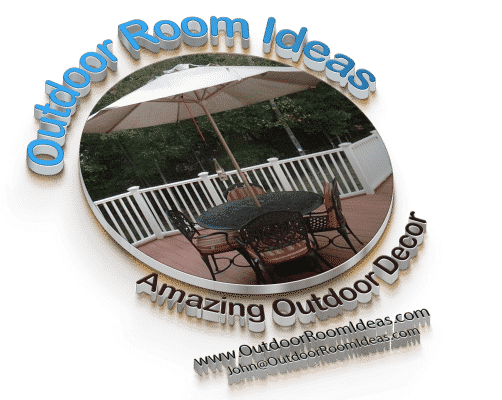
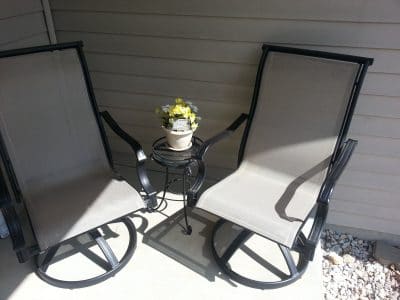
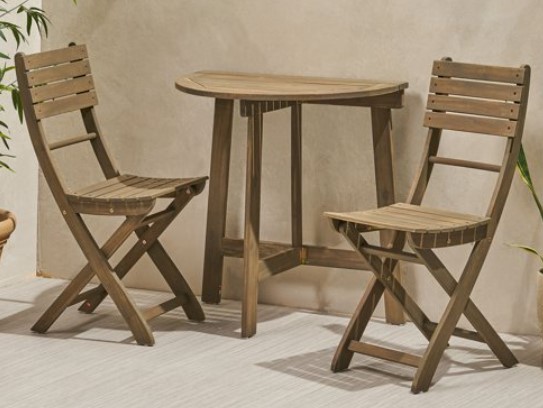
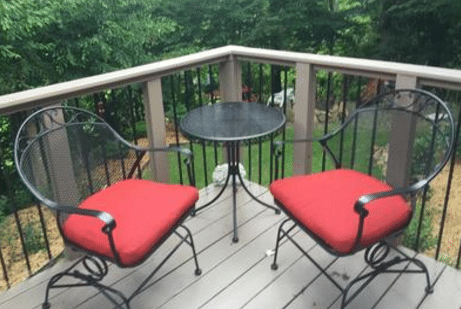
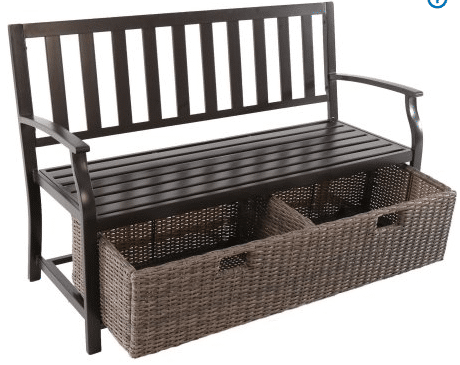
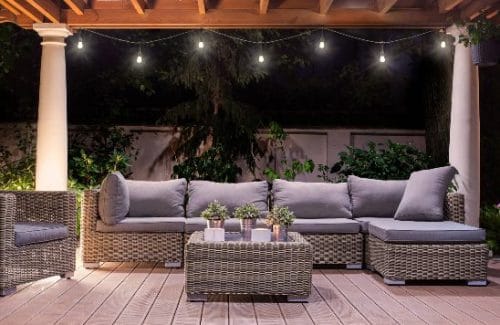
This blog provides valuable insights into optimizing small outdoor spaces, offering practical tips and creative design strategies. The emphasis on furniture placement, color choices, and multifunctional pieces demonstrates a thoughtful approach to making the most of limited space. The real-life examples, such as the bistro table at the lake and the dual-purpose furniture, make the advice relatable and applicable. The inclusion of seasonal decorations and nature-friendly ideas adds a delightful touch, making the patio not only functional but also personalized and inviting. The author’s final thoughts on simplicity and adaptability resonate well with the overall theme, making this blog a helpful guide for anyone looking to enhance their small outdoor spaces.
Herman,
Thanks for your comments and glad you found this information helpful for your small patio area.
John
Hey John,
Lots of good tips here on optimizing/maximizing smaller outdoor patio spaces. Seems like a lot of people would benefit from this information, especially younger folks or people who live in urban areas.
The vertical gardening tip in particular is spot on! Never really thought about that – it adds color in places that need them the most, gets those pots off the ground, and frees up space, which tricks the eye into thinking there is more room.
Ben,
Having some color in your small outdoor space is hard. Using your wall space is a great way to get color and be able to change the color quickly if you need to.
John